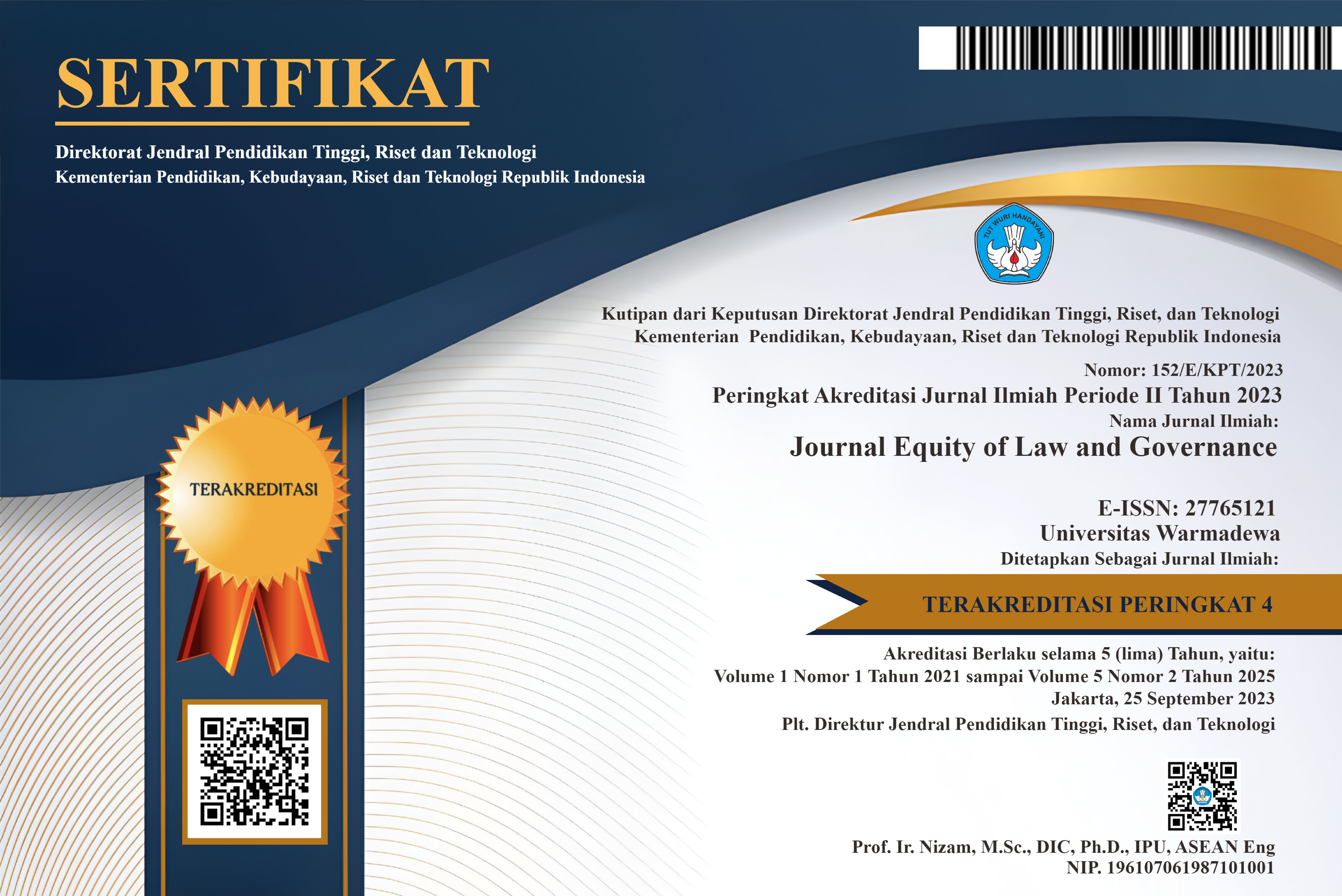Critical Analysis of The Republic of Indonesia Police in The Implementation of Cybercrime Law in Indonesia
Abstract
The purpose of this research, which is based on an evaluation of Indonesia's cybercrime legislation, is to examine the difficulties encountered by the Indonesian National Police in carrying out their duties to combat cybercrime and computer crime, and to draw conclusions about how recent technological advancements have contributed to an increase in both the frequency and severity of these crimes. This study employs a philosophical and analytical approach to normative law as its research methodology. It examines applicable statutes and regulations, as well as legal theory and current practices in law enforcement. Cybercrime is on the rise, and the study's findings suggest that this trend is directly tied to the expansion of information technology, which in turn allows cybercriminals to employ more complex strategies. Not having clear legislative restrictions pertaining to cybercrime, insufficient preparation on the part of law enforcement, subpar system security, and an uninformed public are the primary challenges. Some of the proposals include creating communication platforms amongst law enforcement agencies to boost collaboration in the fight against cybercrime, educating the public and conducting targeted investigations using cutting-edge technical methods, and expanding outreach and education efforts to the general population.
References
Antoni, A. (2017). Kejahatan Dunia Maya (Cyber Crime) Dalam Simak Online. Nurani: Jurnal Kajian Syari’ah dan Masyarakat, 17(2), 261–274. http://jurnal.radenfatah.ac.id/index.php/Nurani/article/view/1192
Bunga, D. (2019). Legal Response to Cybercrime in Global and National Dimensions. PADJADJARAN JURNAL ILMU HUKUM (JOURNAL OF LAW), 6(1), Article 1. https://journal.unpad.ac.id/pjih/article/view/19679
Fahmi, T. (2014). KERENTANAN INDONESIA DARI ANCAMAN KEJAHATAN TERORGANISASI (ORGANIZED CRIME) PADA SEKTOR-SEKTOR EKONOMI, KEMANANAN HINGGA POLITIK Oleh. Jurnal Sosiologi, 2(1), 48. https://garuda.kemdikbud.go.id/documents/detail/2230285
Galih, Y. S. (2019). YURISDIKSI HUKUM PIDANA DALAM DUNIA MAYA. Jurnal Ilmiah Galuh Justisi, 7(1), Article 1. https://doi.org/10.25157/jigj.v7i1.2138
Givens, A. (2023). New Knowledge, Better Decisions: Promoting Effective Policymaking Through Cybercrime Analysis. International Journal of Cybersecurity Intelligence & Cybercrime, 6(1). https://doi.org/10.52306/2578-3289.1153
Ishaq. (2017). Metode Penelitian Hukum Dan Penulisan Skripsi, Tesis, Serta Disertasi. Dalam ALFABETA, cv.
Kroedel, T. (2023). Norms, epistemic norms, context, and counterfactuals. Synthese, 201(5), 172. https://doi.org/10.1007/s11229-023-04162-x
Mahmud Marzuki, P. (2005). Penelitian Hukum. Kencana Prenada Media Group.
Mohammed, K. H., Mohammed, Y. D., & Solanke, A. A. (2019). Cybercrime and digital forensics: Bridging the gap in legislation, investigation and prosecution of cybercrime in Nigeria. http://oer.udusok.edu.ng:8080/xmlui/bitstream/handle/123456789/836/Bridging%20the%20gap%20in%20Legislation%20Investigation%20and%20Prosecution%20of%20Cybercrime%20in%20Nigeria.pdf?sequence=1
Mohsin, K. (2021). The Internet and its Opportunities for Cybercrime–Interpersonal Cybercrime. SSRN Electronic Journal. https://doi. org/10.2139/ssrn, 3815973. https://doi. org/10.2139/ssrn 3815973
Oni, S., Araife Berepubo, K., Oni, A. A., & Joshua, S. (2019). E-Government and the Challenge of Cybercrime in Nigeria. 2019 Sixth International Conference on eDemocracy & eGovernment (ICEDEG), 137–142. https://doi.org/10.1109/ICEDEG.2019.8734329
Puluhulawa, J., Muhtar, M. H., Towadi, M., Swarianata, V., & Apripari. (2023). The Concept of Cyber Insurance as a Loss Guarantee on Data Protection Hacking in Indonesia. Law, State and Telecommunications Review, 15(2), Article 2. https://doi.org/10.26512/lstr.v15i2.44206
Rahman, I., Muhtar, M. H., Mongdong, N. M., Setiawan, R., Setiawan, B., & Siburian, H. K. (2024). Harmonization of Digital laws and Adaptation Strategies in Indonesia focusing on E-Commerce and Digital transactions. Innovative: Journal Of Social Science Research, 4(1), Article 1. https://doi.org/10.31004/innovative.v4i1.8240
Sari, I. (2023). MENGENAL HACKING SEBAGAI SALAH SATU KEJAHATAN DI DUNIA MAYA. JSI (Jurnal sistem Informasi) Universitas Suryadarma, 10(2), Article 2. https://doi.org/10.35968/jsi.v10i2.1086
Shah, I. A., Habeeb, R. A. A., Rajper, S., & Laraib, A. (2022). The Influence of Cybersecurity Attacks on E-Governance. Dalam Cybersecurity Measures for E-Government Frameworks (hlm. 77–95). IGI Global. https://doi.org/10.4018/978-1-7998-9624-1.ch005
Siburian, H. K. (2016). Emerging Issue in Cyber Crime: Case Study Cyber Crime in Indonesia. International Journal of Science and Research, 5(11), 511–514.
Supriadi, A. (2020). The Role of the Sub Directorate of Cyber Crime, Ditreskrimsus in Investigating Crime of Cyber Crime. Law Development Journal, 2(3), Article 3. https://doi.org/10.30659/ldj.2.3.412-418
Tanjung, I. U., & Adriani, E. N. (2022). POLITIK HUKUM TERHADAP PENANGGULANGAN KEJAHATAN DUNIA MAYA. Judge : Jurnal Hukum, 3(01), Article 01. https://doi.org/10.54209/judge.v3i01.371
 Abstract viewed = 169 times
Abstract viewed = 169 times
 PDF downloaded = 116 times
PDF downloaded = 116 times













